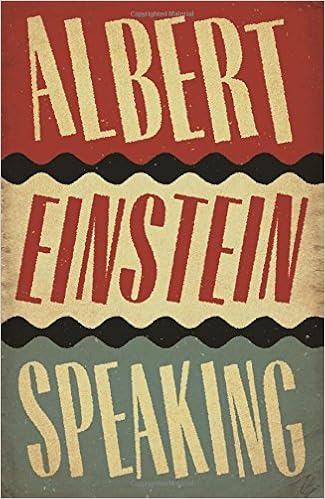I’m not certain what this book is. It is described as a novel, a work of fiction, but it seems to be a biography of Albert Einstein. It even has actual photos included! The only fictional element seems to be Mimi Beaufort, a 17-year-old girl who accidentally dials Einstein’s phone number.
The book opens promisingly.
Mimi misdials and ends up reaching Einstein on the day of his 75th
birthday. They chat very briefly and end
with promises to talk again. The first
chapter even has touches of humour:
Einstein tells his secretary, “’When a man sits with a pretty girl for
an hour, it seems like a minute. But let
him sit on a hot stove for a minute and it’s longer than any hour. That’s relativity.’” This beginning suggests I can expect to read
what the publisher described: “From
their first conversation Mimi Beaufort had a profound effect on Einstein and
brought him, in his final years,
back to life. In turn he let her into
his world.” A “riotous, charming and
moving novel” is promised, but what the reader gets is a poorly-written
biography of the famous scientist. The
reader has to plow through 75% of the book before Mimi actually shows up
again! And since Mimi supposedly speaks
to Einstein on March 14, 1954, and Einstein died 13 months later, on April 17,
1955, how can Mimi have had a profound influence on his final years?
Even if this were a biography, it has so many unnecessary
details. When Albert moves, we are told,
“The three-room apartment is at Wittelsbacherstraße 13 in a well-to-do
neighbourhood near Fehrbelliner Platz.
He has a telephone number, Berlin 2807.”
When Albert takes trips on the lake in Zürich, the reader gets the
ship's provenance: “The family takes trips
on the paddle-steamer Stadt Rapperswil,
built by Escher, Wyss & C. for the Zürich-Schifffahrtsgesellchaft.” When Einstein encounters any fellow
scientist, that person’s accomplishments are enumerated: “Lorentz shared the 1902 Nobel Prize with his
fellow Dutchman Pieter Zeeman for the discovery of the Zeeman effect: ‘in
recognition of the extraordinary service they rendered by their researches into
the influence of magnetism upon radiation phenomena’.” We are informed that Archduke Franz Ferdinand
was assassinated with a “blowback-operated, semi-automatic FN Model 1910
Browning pistol, manufactured by Fabrique Nationale in Belgium.” This is essential information in a biography
of Einstein? We are given the list of
Albert and Elsa’s shopping: “red cabbage,
goat fat and kippered herring. Bottles
of essence of lily of the valley.” Then
there are geography lessons: “Albert
lectures in Sendal, northeast of Tokyo on Honshu island; in Nikko, in the
mountains north of Tokyo; in Nagoya, in the Chūbu region; in Kyoto, and in
Fukuoka on the northern shore of Japan’s Kyushu island.” And do we really need to know that Elsa
rummages in her handbag “for her phials of aromatic perfumes: Aventure, with its notes of cedar wood, amber
and pink pepper, Linde Berlin, which evokes Berlin’s famously fragrant linden
trees, and Violet, based on a perfume created for Marlene Dietrich” ? This type
of extraneous detail is found throughout and to say it becomes tedious is an
understatement.
The style is very disjointed. Sentences are strung together without
connection: “The 16,500-ton Red Star
Line’s SS Westernland sails from
Antwerp with Elsa and Helen Dukas aboard.
An unmarked police car deposits Albert on the Southampton quayside
. .
. ” Try to make sense of these
consecutive sentences: “In the summer
they take a holiday on Saranac Lake in the Adirondack Mountains. The doctor administers morphine. Else tries to knit a scarf.” And then there is needless repetition. The information that “Mimi and Isabella might
dream of studying at the Royal Academy of Music in London. Unfortunately there are insufficient funds to
enable them to do so” is followed by “They’ve learned that there are no funds
available to meet the Royal Academy of Music’s tuition fees, travel and
accommodation expenses.”
At times, things that are mentioned make no sense. Einstein suffers from “violent diarrhoea” but
is told to drink water and to exercise “to stimulate his bowel movements”? The passage of time is not clearly delineated
so confusion results. For example, the
reader is told that “Mileva suffers a nervous breakdown and is confined in the Zürich
Theodosianum Parkseite Klinik.” Three
sentences later, we are told that “Mileva and Tete are confined in the
Bethanien Klinik in Zürich – Mileva with chronic nerve pressure on her
spine.”
As I stated at the beginning, I’m not certain what this book
is trying to be. In actuality it seems
like an unrevised rough draft. According
to promotional material for the book, Ian McEwan has stated that R. J. Gadney, “has
conjured, with an accomplished novelist's art, a strange and luminous fiction,
a literary gem.” I’m a great admirer of
Ian McEwan’s writing, but he and I definitely disagree about the quality of
this book.
Note: I received a digital galley from the publisher via NetGalley.

No comments:
Post a Comment